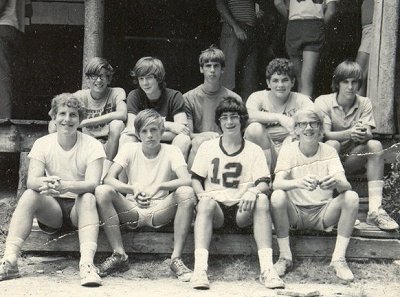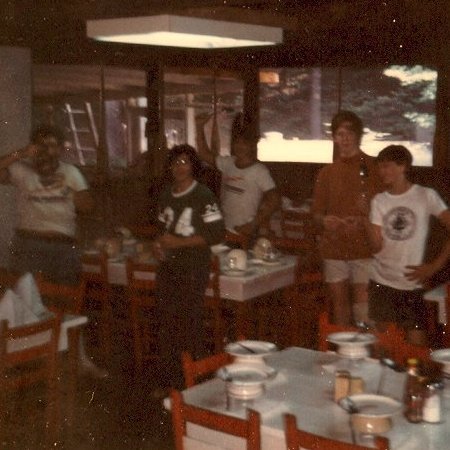by Tim Stuart
I always assumed that the Junior Counselor program at Deerwoode was begun as a typical “Counselor in Training” program — in a style that existed at most summer camps of the time. I have since heard that there was a mutiny by the counselors in 1969 that resulted in Bill sending most of the staff packing. He quickly realized that he needed a program to train counselors to step into the breech if he needed to fire a counselor or two during the summer (which he did often enough). Regardless of its origins, the JC Program evolved into an expansive, inspirational, and demanding endeavor.

I had the unique perspective of being a JC near the beginning of this evolution. Thanks to Bill Mayes’s desire to have all those associated with Deerwoode to reach his full potential, not only were we prepared to be effective and responsible counselors, but we learned a great deal of life lessons that influenced our personal growth and sense of self so crucial to future success.

For example, in 1973 and 1974, my first two years as a JC, we lived in one of the cabins high on the hill (cabin 16) and one of our most important functions was to work in the dining hall during mealtimes. This entailed assisting the cooks, Effie Fowler and Frank English, with preparing the meals and keeping the equipment and dishes washed. We would also become servers during the meals, busing the tables when finished. We would then prepare the dining hall for the next meal before participating in many of the activities and competitions as an “older camper”.
Bill revamped the program in the summer of 1975. He had built a brand-new gym specifically for the PC Program and moved all the JCs to spacious digs on the second floor of this gym. Our open room overlooked the regulation basketball court which was used during the day for PC.
Bill also expanded our duties. Mrs. Fowler retired and Frank did not return. At the encouragement of Mrs. Fowler, Bill realized that the JCs could pick up the slack completely in the Dining Hall. He established a rotating JC job as the “Kitchen Man”, with specific duties and rules that was modified as needed. The Kitchen Man was essentially responsible for the dining hall exclusively, including menu planning, ordering food and supplies, organizing the kitchen helpers and supervising all facets of the dining hall. We were teenagers, mind you, that were expected to make “adult” decisions. Did we make mistakes? Absolutely. We also learned the value of accepting responsibility for those mistakes and we grew by leaps and bounds. There was no question that we would rise to the challenges presented to us – that was the expectation and you just did it.
We were assigned many other adult responsibilities such as mowing the fields using the full-size Ford tractor with attachments. In addition, long before we were old enough to drive on a road, we were driving vehicles in the protected environment and on the open fields of Deerwoode, mastering sticks and clutches because that’s all there was.
On Saturdays, as I recall, the counselors were given the night off from dinnertime until the wake-up bell on Sunday morning (although it was very rare for a counselor to use this entire time). The evening supper consisted of hamburgers grilled outside by Bill and the JCs and eaten picnic-style on the grounds outside the dining hall. It was at this time that the “JC” became “Junior Counselors” for real. Saturday evening each JC was assigned a cabin of campers with which to engage until the counselor returned to relieve them. They would rotate among the different age groups, thus gaining valuable experience.
The sense of personal responsibility was drummed into us and we were proud to maintain high standards. Being teenagers, however, we would make mistakes, miss deadlines, or otherwise fail in performing our duties. On those occasions, we would acknowledge our missteps and accept whatever disciplinary action that was warranted. Every now and then, Bill would hold a “Kangaroo Court” among the JCs – so named because almost everybody who had an infraction of the rules was adjudicated guilty by his peers as it was hard to argue with Bill’s black and white interpretation of the world. You were either right or wrong and the guilty party usually realized the truth of this and accepted whatever punishments were deemed appropriate. The most frequent infractions included DDO (Direct Disobedience of Orders), DA (Dumbass move), Promptness problems, or Shirking of Responsibility. Penalties included blade duty (cutting high grass with a manual grass cutter in a distant field), a lick from the lanyard (corporal punishment with a plastic lanyard across the hindquarters), or a fine deducted from our “paycheck” (which we did receive at the end of the summer). In the years I was there, Bill would sometimes use accrued fines to take the JCs “on the town”, either to the Biltmore Ice Cream Store or to a steak house in Fletcher to consume steaks the size of our heads.
After I graduated out of the JC Program and began my tenure as a Deerwoode Counselor, the Program continued to evolve. This was about the time that our late friend and Deerwoode legend, Robert “Powermove” Adams elevated to the ranks of the JCs. He has provided us with some of the details of the the Kangaroo Court and the intricate fine system.

Recent Comments